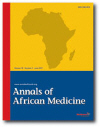
|
Annals of African Medicine
Annals of African Medicine Society
ISSN: 1596-3519
Vol. 8, No. 3, 2009, pp. 168-172
|
 Bioline Code: am09035
Bioline Code: am09035
Full paper language: English
Document type: Research Article
Document available free of charge
|
|
|
Annals of African Medicine, Vol. 8, No. 3, 2009, pp. 168-172
| fr |
Chukwubike, Onwuchekwa A & God'spower, Asekomeh E
Résumé
arrière-plan : tétanos reste l’un des dangers de santé publique majeur du monde en développement. De précédentes études au Nigeria, mortalité allait from26 % à 60 %. La mortalité est beaucoup plus faible en les pays développés en raison de la disponibilité des installations de forte intensité soin de cas contrairement à la plupart des pays en développement.
but : pour signaler notre expérience de la gestion du tétanos adulte dans l’hôpital d’enseignement University de Port Harcourt sur la cours des dix dernières années (1996-2005).
méthodes : données de tous les patients âgés de 16 ans et au-dessus de géré pour le tétanos dans les quartiers médicales entre janvier 1996 et décembre 2005 ont été extraites de leurs enregistrements affaires et analysées.
résultats : quatre-vingt six patients étaient gérés pour le tétanos (50 mâles et 36 femelles), qui constituent environ 1 % de tout médicale admission sur la période de 10 ans. Étudiant, fonctionnaires et commercial moteurs cyclistes ont formé les principaux groupes à risque. La plus courante portail d’entrée a été blessé un membre inférieur (54 %). Taux de létalité (CFR) s’est 42.9 %, avec un statistiquement signifi cative CFR plus élevé chez les patients au-dessus de 40 ans (p = 0.000), patients avec période d’incubation plus courte que 7 jours (p = 0,04), ces pour une durée plus courte de l’hospitalisation (p = 0.000) et administré supérieur en moyenne quotidiennement les doses de diazépam (p = 0.044) .Complications comme aspiration pneumonitis, de laryngospasm et d’insuffi sance respiratoire étaient grandes causes de taux de mortalité.
conclusion : taux d’accidents mortels cas de tétanos a restés constamment élevés dans notre centre. Facteurs qui ont été considérablement associé à forte mortalité incluse leur vieillesse au-dessus de quarante ans, incubation période de moins de sept jours et plus haut degré de sédation avec diazépam. Il est recommandé que la vaccination préventive contre le tétanos être donné à tous Nigérians avec vaccination secondaire à l’âge adulte.
Mots Clés
tétanos, le résultat. Hôpital tertiaire
|
| |
| en |
A 10-year review of outcome of management of tetanus in adults at a Nigerian tertiary hospital
Chukwubike, Onwuchekwa A & God'spower, Asekomeh E
Abstract
Background : Tetanus remains one of the major public health hazards of the developing world. Previous studies in Nigeria indicate that mortality ranged from 26% to 60%. Mortality is much lower in the developed world because of the availability of facilities for intensive care of cases, unlike in most developing countries.
Aim : To report our experience with the management of adult tetanus at the University of Port Harcourt Teaching Hospital over the past 10 years (1996-2005).
Methods : Data of all patients aged 16 years and above managed for tetanus in the medical wards between January 1996 and December 2005 were retrieved from their case records and analyzed.
Results : Eighty-six patients were managed for tetanus (50 males and 36 females), constituting about 1% of all medical admissions over the 10-year period. Students, civil servants and commercial motorcyclists formed the major groups at risk. The commonest portal of entry was lower limb injuries (54%). Case fatality rate (CFR) was 42.9%, with a statistically significant higher CFR found among patients above 40 years of age (P= .000), patients with incubation period shorter than 7 days (P= .04), those with a shorter duration of hospitalization (P= .000) and those administered higher average daily diazepam doses (P= .044). Complications such as aspiration pneumonitis, laryngospasm and respiratory failure were major causes of mortality.
Conclusion : Case fatality rate of tetanus has remained consistently high at our center. Factors that were significantly associated with high mortality included older age, age above 40 years , incubation period of less than 7 days and higher degree of sedation with diazepam. It is recommended that preventive immunization against tetanus be given to all Nigerians with secondary vaccination at adulthood.
Keywords
Outcome, tertiary hospital, tetanus
|
| |
© Copyright 2009 Annals of African Medicine.
Alternative site location: http://www.annalsafrmed.org
|
|
